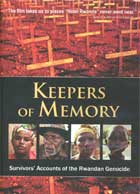
Keepers of Memory 2005
Distributed by Choices, Inc., 3740 Overland Ave., Ste. F, Los Angeles CA 90034; (310) 839-1500
Produced by Link Media Production
Directed by Eric Kabera
DVD, color, 52 min.
Sr. High - Adult
Holocaust and Genocide Studies, Human Rights, African Studies
Date Entered: 01/12/2006
Reviewed by Rob Sica, Eastern Kentucky UniversityThis gravely absorbing and – particularly in light of the ongoing genocide currently transpiring in the Darfur region of Sudan at the time of this writing – necessary documentary consists of interviews with survivors (and, chillingly, some perpetrators) of the Rwandan genocide in which more than 800,000 Tutsis and Hutu moderates were slaughtered by Hutus with horrifying dispatch over the course of 100 days between early April and mid July of 1994. Among the killing sites and memorials visited by director Eric Kabera are the Nyanza Memorial on the outskirts of the Rwandan capital city of Kigali (where over 2,000 were murdered in the wake of the withdrawal of UN Peace Keeping forces); Ntarama Church (in which bones of over 5,000 dead remain); the Nyange Memorial (composed of ruins from a church bulldozed on order of the parish priest where over 2,000 Tutsi refugees were murdered); Murambi (over 27,000 murdered at a school); Nyamata Church (about 2,500 murdered); and Nyarubuye Convent (over 20,000 murdered). Kabera crafts a rightly haunting mosaic of trauma and grief from the deeply personal and morally resonant testimonies drawn from survivors of each of these places.
Though survivors’ indignant recollections of the international community’s appallingly willful negligence are plentiful, and Kabera intersperses footage of, for instance, UN vehicles evacuating Kigali during the onset of the genocide, menacing roadside bands of Interahamwe militiamen brandishing machetes and sticks, a solemn President Clinton during his 2002 visit to Rwanda, and a few leaders of the genocide facing trial – nevertheless, this documentary is not, nor is it intended to be, a general overview or analysis of the genocide (such as the highly recommendable PBS Frontline documentary Ghosts of Rwanda), but is rather an invaluable complement to such a broader project, as well as a powerful impetus for viewers to inform themselves further.
Extra features include a Lesson Plan/Guidebook (available here in PDF) made in collaboration with the Genocide Teaching Project at the American University Washington College of Law Center for Human Rights and Humanitarian Law, as well as a Director’s Commentary track that is moving, reflective and informative enough to warrant an additional viewing with this feature activated.